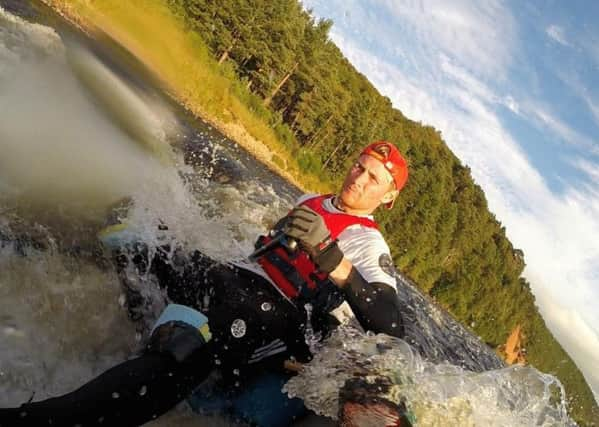Film shows canoe duo setting new record for descent of River Spey


One such film is Spey in a Day, in which English duo James Reilly and Ted Simpson attempt to set a new record for the fastest canoe descent of Scotland’s fastest river, starting at Kingussie and paddling 120km to the coast. For all the talk of setting records, the pair are keen to stress that they are by no means expert paddlers, and the record attempt was really just an excuse to embark on a particularly ambitious one-day adventure.
“We’re definitely not good canoeists,” Simpson tells me, “this was more about having fun really, and wanting to pull off a ridiculous challenge.”
Advertisement
Hide AdAdvertisement
Hide AdAs if to make the point, in a piece to camera during the film, Reilly is asked “would you say that you’re a good canoer?” To which he responds “Erm... I think we have our own style...” Cue a quick montage, soundtracked by frantic banjo music, in which the pair get hung up on rocks, narrowly avoid low-hanging branches and ping-pong somewhat chaotically through boiling rapids. It may not look all that professional, but it does look like a ton of fun.
Long before they came anywhere near a submerged rock, the first obstacle Reilly and Simpson had to overcome was that, as far as they knew, nobody had previously attempted a timed descent of the Spey all the way from Kingussie to the sea. If they were going to set the record for navigating this stretch of river, then, they wanted to make sure it was a reasonably good one.
“We decided to do what is generally known as the full descent from Kingussie, which is just about as high up the river as you can canoe, especially in summer because it gets too shallow,” says Simpson. “The few people that had set earlier records had done it from way further down the river – and they’d done that in about 12 hours. We calculated what would be a good time to beat, and then afterwards, once we had our time, we emailed a couple of people – the guys that had set the shorter distance records – and said ‘Are you OK with us calling this a record?’ And they said ‘Yeah, that’s fine,’ and verified it for us. One of the guys was Ray Goodwin – he’s written a book about the River Spey so he’s really the guy to ask”.
In order to maximise their chances of arriving in daylight, Simpson and Reilly set off at 5am, in almost total darkness.
“It was all a bit dodgy and we were quite tentative,” says Simpson. “Not long after we’d started we paddled under the bridge at Kingussie and about a million bats started flying around the canoe, so it was a bit of an ominous set-off, but it was relatively collision-free. It actually wasn’t until the sun came up that problems arose because the sun was reflecting off the river, so for a time we couldn’t see anything at all – we ended up bumping into just about every rock we could find.”
The Spey has some tricksy rapids along its length, so in an open Canadian canoe a fair bit of bailing was required.
“We had to take bailing breaks every time we’d shot down something that was particularly bumpy,” says Simpson. “Thankfully it was a nice sunny day, so we dried off quickly.
Advertisement
Hide AdAdvertisement
Hide Ad“The biggest rapid is probably the Washing Machine,” he continues. “We thought we were in the clear on the final stretch to Fochabers but then you hear this roar – you go round the corner and there’s this steep drop into the Washing Machine, which is just several standing waves, so you just get bounced around. That was fairly late in the day, but the good thing about rapids is they keep you awake.”
Keeping awake proved to be about the biggest challenge the duo faced, as the hours ticked by and fatigue set in.
“When we knew we were near the end we kept on hoping to see the sea around each river bend,” Reilly says in the film, and when they eventually reach Spey Bay their relief is palpable. The record they set is 15 hours, 51 minutes and 43 seconds. No doubt people will be queuing up to try and beat it this summer, but as Spey in a Day shows, trying to break records is by no means the only reason to explore this magnificent river. n
www.emff.co.uk